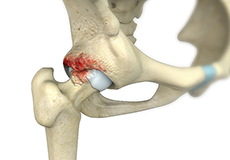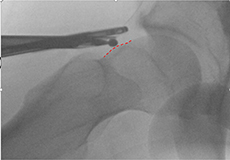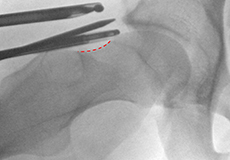Femoroacetabular Impingement

What is Femoroacetabular Impingement?
Femoroacetabular impingement (FAI) is a condition where there is abnormal contact between your femoral neck and the acetabulum (the socket). This contact occurs due to bony irregularities of the ball or socket leading to pain, decreased range of hip motion, labral tears, and cartilage damage.
The articular cartilage and labral tissue can fray or tear after repetitive contact of this abnormal socket.
Types of Femoroacetabular Impingement
FAI impingement generally occurs as two forms: Cam and Pincer impingement.
- Cam Impingement: The Cam form of impingement is when the femoral head and neck are not perfectly round, most commonly due to excess bone that has formed. This lack of roundness and excess bone causes abnormal contact between the surfaces.

Intraoperative radiograph showing FAI with CAM deformity outlined with red line.
This is prior to using bur to recontour the femoral head-neck junction.
- Pincer Impingement: The Pincer form of impingement is when the socket or acetabular rim is too deep. It covers too much of the femoral head resulting in increased contact between the ball and socket. The Pincer form of impingement may also be caused when the hip socket is abnormally angled backwards causing abnormal impact between the femoral head and the rim of the acetabulum.

Intraoperative radiograph after recontouring the CAM deformity to restore a more normal
head-neck shape and relieve impingement with the acetabulum and labrum.
Most patients with FAI have a combination of the Cam and Pincer forms.
Symptoms of FAI
Symptoms of femoroacetabular impingement can include the following:
- Groin pain associated with hip activity and worse with hip flexion
- Complaints of pain in the front, side or back of the hip
- Pain may be described as a dull ache or sharp pain
- Patients may complain of a locking, clicking, or catching sensation in the hip
- Pain often occurs to the inner hip or groin area after prolonged sitting or walking
- Difficulty in walking uphill
- Restricted hip movement
- Low back pain
- Pain in the buttocks or outer thigh area
Risk Factors for the Development of FAI
A risk factor is something that is likely to increase a person’s chances of developing a disease or condition. Risk factors for developing femoroacetabular impingement may include the following:
- Athletes such as football players, weight lifters and hockey players
- Workers engaged in heavy labor
- Repetitive hip flexion
- Congenital hip dislocation
- Anatomical abnormalities of the femoral head or angle of the hip
Diagnosis of FAI
FAI is diagnosed based on your medical history, a physical examination and diagnostic studies, including X-rays, MRI scans and CT scan.
Treatment Options for FAI
Conservative treatment options refer to management of the problem without surgery. Non-surgical management of FAI will not change the underlying abnormal bone shape that is contributing to the FAI but may improve your pelvis position to relieve pain and impingement. Therapy may also provide relief of muscle inflammation that can mimic symptoms of FAI.
The conservative treatment measures for FAI include:
- Rest
- Activity Modification and Limitations
- Anti-inflammatory Medications
- Physical Therapy
- Injection of steroid and analgesic into the hip joint
The surgical treatment for FAI includes:
- Hip arthroscopy to address femoroacetabular impingement can comprise of reshaping the femoral head, trimming the acetabular rim, repairing labral tears, and addressing cartilage lesions.








